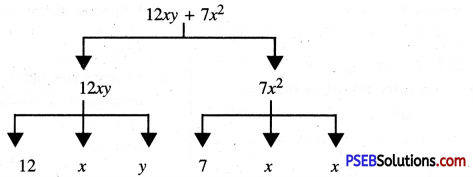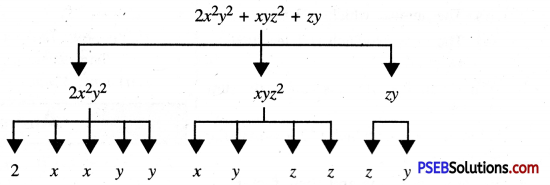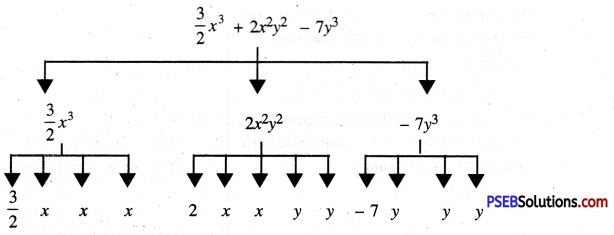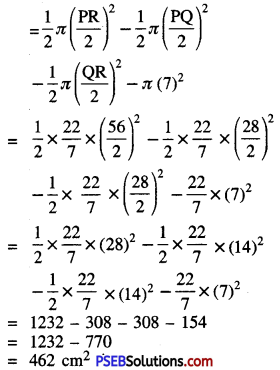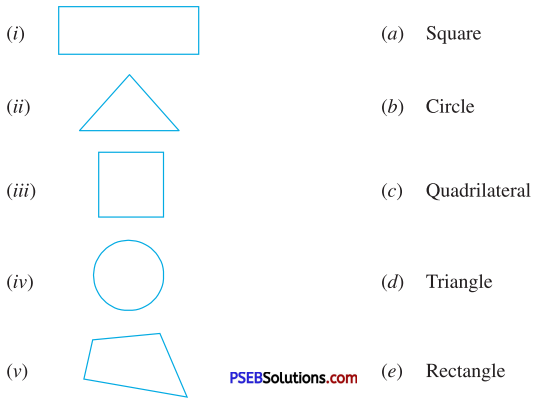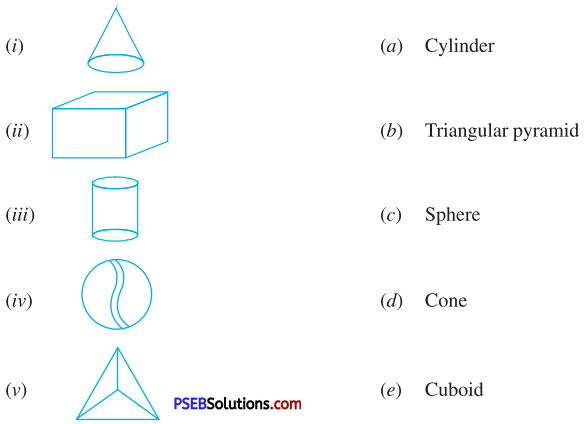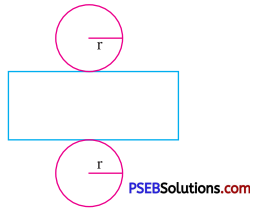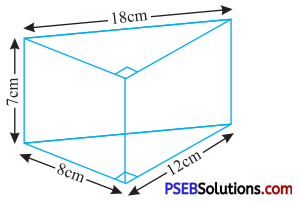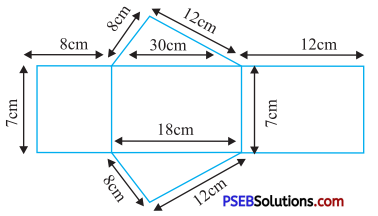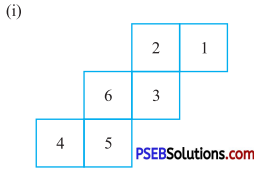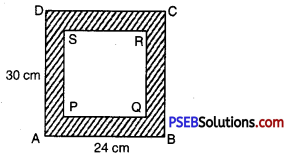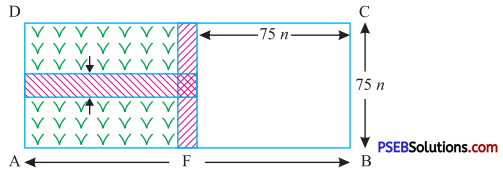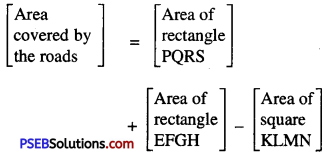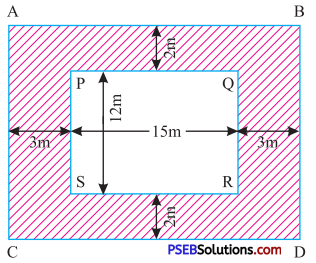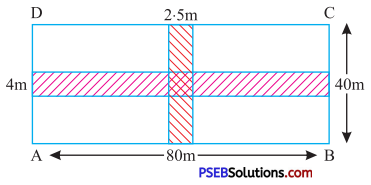Punjab State Board PSEB 7th Class Hindi Book Solutions Chapter 2 धूल का फूल Textbook Exercise Questions and Answers.
PSEB Solutions for Class 7 Hindi Chapter 2 धूल का फूल
Hindi Guide for Class 7 PSEB धूल का फूल Textbook Questions and Answers
(क) भाषा-बोध
1. शब्दार्थ
सरपट – तेज़ चाल से
खलिहान = कटी हुई फसल रखने का स्थान
विपन्नता = गरीबी
मजूरी = मज़दूरी
व्यर्थ = बेकार
मुटियार = नवयुवती
उत्थान = उन्नति, बढ़ती
जन्नत = स्वर्ग
निहारते = देखते
प्रांगण = आंगन
पुष्प-गुच्छ = फूलों का गुलदस्ता
गुंजायमान = गूंजता हुआ
2. इन मुहावरों के अर्थ लिखते हुए वाक्य प्रयोग करें:
खुशी के आँसू छलकना ________________ ___________________________
मन बल्लियों उछलना _____________ _________________________
नाम रोशन करना __________________ ______________________
गले लगाना ________________ _______________________
फूले न समाना _______________ __________________________
उत्तर:
खुशी के आँसू छलकना (बहुत अधिक प्रसन्न होना) – परीक्षा में प्रथम आने का समाचार मिलते ही नीलम की आँखों में खुशी के आँसू छलकने लगे।
मन बल्लियों उछलना(बहुत प्रसन्न होना) – बहुत दिनों बाद गाँव जाते हुए प्रशांत का मन बल्लियों उछलने लगा।
नाम रोशन करना (प्रसिद्धि मिलना) – कलक्टर बन कर प्रशांत ने अपने माता-पिता का नाम रोशन कर दिया।
गले लगना (प्रेम से भेंटना) -माता ने पुत्र को आशीर्वाद देते हुए बाँहों में भरकर गले लगा लिया।
फूले न समना (बहुत प्रसन्न होना) – एशिया-कप हॉकी में विजय प्राप्त कर भारतीय खिलाड़ी फूले न समा रहे थे।

3. विपरीत शब्द लिखें:
मौन = ……………..
ऊबड़-खाबड़ = ……………
ज़रूरी = ……………..
शहर = …………….
सुनसान = ……………….
मजदूर = ……………..
आमदन = ………………
उत्थान = ……………
उत्तर:
शब्द विपरीत शब्द
मौन = मुखर
ऊबड़-खाबड़ = सीधी-सपाट
ज़रूरी = गैर-ज़रूरी
शहर = गाँव
सुनसान = आबाद
मजदूर = मालिक
आमदन = खर्च
उत्थान = पतन
4. दो-दो पर्यायवाची शब्द लिखें :
तरक्की = ……………
शिक्षा = ……………
अध्यापक = ……………
मेहनत = …………….
शिष्य = …………….
उत्तर:
शब्द पर्यायवाची शब्द
तरक्की = वृद्धि, बढ़ती
शिक्षा = परामर्श, सलाह, तालीम, सबक
अध्यापक = शिक्षक, गुरु
मेहनत = परिश्रम, श्रम
शिष्य = चेला, विद्यार्थी
प्रयोगात्मक व्याकरण
गुरु की शरण = गुरुशरण
माँ और बाप = माँ-बाप
उपर्युक्त पदों में गुरु की शरण को गुरुशरण तथा माँ और बाप को माँ-बाप रूप में संक्षेप में लिख सकते हैं। इस प्रकार शब्दों के मेल से नए शब्द बन जाते हैं।
अतः परस्पर सम्बन्ध रखने वाले दो या दो से अधिक शब्दों के मेल से जब कोई नया सार्थक शब्द बनता है तो उस मेल को समास कहते हैं।
समास करने के बाद जो शब्द बनता है उसे समस्तपद कहते हैं। समस्तपद को इसके शब्द खण्डों में अलग-अलग करने की विधि को विग्रह कहते हैं। जैसे :
गुरुशरण (समस्त पद) = गुरु की शरण (विग्रह)
विशेष:
समस्त पद के दो पद होते हैं- पूर्व पद और उत्तर पद। पहले पद को पूर्व पद तथा बाद को उत्तर पद कहते हैं। जैसे-गुरु (पूर्व पद), शरण (उत्तर पद)
पदों की प्रधानता के आधार पर समास के चार भेद होते हैं :
- अव्ययीभाव समास
- तत्पुरुष समास
- द्वंद्व समास
- बहुब्रीहि समास
| (क) |
समस्त पद |
विग्रह |
जिस अर्थ में अव्यय यहाँ प्रयुक्त हुआ |
| (1) |
बेरोज़गार |
रोज़गार के बिना |
‘बे’ का प्रयोग के बिना’ अर्थ में हुआ है। |
| (2) |
आजीवन |
जीवन तक |
‘आ’ का प्रयोग तक के अर्थ में हुआ है। |
| (3) |
यथानियम |
नियम के अनुसार |
‘यथा’ का प्रयोग ‘अनुसार’ के अर्थ में हुआ है। |
यहाँ समस्त पद में ‘बे’, ‘आ’ तथा ‘यथा’ अव्यय हैं तथा इसके मेल से पूर्ण पद ही अव्यय बन गया है।
अतएव जिस समस्त पद में पूर्वपद प्रधान हो और अव्यय हो और समास होने पर पूर्ण पद ही अव्यय बन जाए, वह अव्ययी भाव समास कहलाता है।
अन्य उदाहरण-आमरण-मरने तक, निडर-डर के बिना, भरपेट-पेट भर कर, आजन्म-जन्म भर, प्रति पल-हर पल, बेखबर-बिना खबर के, अनजान-जाने बिना आदि।
तत्पुरुष समास को समझने के लिए कारक का ज्ञान अपेक्षित है। अत: पहले कारकों को समझते हैं।
हमें साहब ने रहने के लिए घर दिया।
यदि इस वाक्य को इस ढंग से लिखें-‘हमें साहब रहने घर दिया’ तो वाक्य में आए शब्दों का एक-दूसरे से सम्बन्ध नहीं प्रकट होता और न ही अर्थ स्पष्ट होता है।
इसलिए वाक्य में आए ने, के लिए चिह्न वाक्य के अन्य शब्दों का परस्पर सम्बन्ध जोड़ते हैं।
अतएव संज्ञा या सर्वनाम के जिस रूप से उनका सम्बन्ध क्रिया तथा वाक्य के दूसरे शब्दों में जाना जाए, उसे कारक कहते हैं।
विशेष :- वाक्य में प्रयुक्त ‘के, ने, से, के लिए’ कारक चिह्नों को परसर्ग भी कहते हैं।
(1) शरण ने क्षमा माँगी।
इस वाक्य में क्षमा माँगने का काम शरण ने किया अर्थात् कर्ता शरण है। अतः शरण ने में कर्ता कारक है।
(2) प्रशांत उच्च पद को प्राप्त हुआ।
इस वाक्य में प्राप्त हुआ क्रिया है, प्रशांत कर्ता है तथा क्रिया का फल पद पर पड़ रहा है। अतः पद को में कर्म कारक है।
अतएव वाक्य में जिस संज्ञा या सर्वनाम पर क्रिया का फल पड़ता है, उसे कर्म कारक कहते हैं।

(3) प्रशांत गाड़ी से गाँव आया।
इस वाक्य में गया क्रिया का साधन गाड़ी है। अतः गाड़ी से में करण कारक है।
अतएव कर्ता जिस साधन की मदद से क्रिया सम्पन्न करता है, उसे करण कारक कहते हैं।
(4) हम पढ़ने के लिए विद्यालय जाते थे।
इस वाक्य में जाना क्रिया का कार्य पढ़ने के लिए है, अतः यहाँ सम्प्रदान कारक है।
अतएव जिस संज्ञा या सर्वनाम के लिए कुछ किया जाए उसे सम्प्रदान कारक कहते हैं।
(5) हमारा पूरा परिवार गाँव से शहर आ गया।
इस वाक्य में गाँव से पद से अलग होने का अर्थ स्पष्ट हो रहा है, इसलिए यहाँ अपादान कारक है।
अतः जिस संज्ञा से पृथक्ता अर्थात् अलग होने का भाव प्रकट हो, उसे अपादान कारक कहते हैं।
इसके अतिरिक्त किसी से सीखने, लगाने, डरने, बचाने, तुलना करने, माँगने, निकलने तथा दूरी का भाव दर्शाने में भी अपादान कारक होता है।
(6) नसीब का लड़का कलक्टर बन गया।
इस वाक्य में नसीब का लड़का से पिता-पुत्र का सम्बन्ध प्रकट हो रहा है अतः यहाँ सम्बन्ध कारक है।
अतएव जहाँ दो संज्ञाओं या सर्वनामों का आपस में सम्बन्ध प्रकट हो, वहाँ सम्बन्ध कारक होता है।
(7) प्रशांत पहले गाँव में रहता था।
इस वाक्य में गाँव में पद में रहना क्रिया के आधार का पता चलता है, यहाँ अधिकरण कारक है।
अतएव जहाँ संज्ञा या सर्वनाम शब्द के आधार का पता चले उसे अधिकरण कारक कहते हैं।
(8) अरे शरण गाड़ी जल्दी चलाओ।
इस वाक्य में अरे शरण ! को सम्बोधन किया गया है, इसलिए यहाँ सम्बोधन कारक है।
अतएव संज्ञा या सर्वनाम के जिस रूप से किसी को पुकारने, बुलाने, सुनाने या सावधान करने का भाव प्रकट हो, वहाँ सम्बोधन कारक होता है। आइए, अब तत्पुरुष समास को समझते हैं।
(ख) समस्त पद विग्रह
पदप्राप्त पद को प्राप्त
उपर्युक्त समास में समस्त पद बनाते समय पूर्वपद (पद) के साथ आए परसर्ग (को) का लोप हो गया है। इसके उत्तरपद (प्राप्त) प्रधान है।
अतएव जिस समास में उत्तर पद प्रधान हो उसे तत्पुरुष समास कहते हैं। पद बनाते समय पूर्वपद के साथ आने वाले परसर्ग का लोप हो जाता है।
अन्य उदाहरण
समस्त पद = विग्रह
यशप्राप्त = यश को प्राप्त
समस्त पद = विग्रह
भावविह्वल = भाव से विह्वल
पाठशाला = पढ़ने के लिए शाला
धनहीन = धन से हीन
विद्याभ्यास = विद्या का अभ्यास
सिरदर्द = सिर में दर्द
(ख) विचार-बोध
1. प्रश्नों के उत्तर एक या दो वाक्यों में लिखें:
प्रश्न 1.
प्रशान्त का मन बल्लियों क्यों उछल रहा था ?
उत्तर:
प्रशान्त का मन बल्लियों इसलिए उछल रहा था क्योंकि वह कई वर्षों के बाद अपने गाँव जा रहा था।
प्रश्न 2.
गाँव की ओर जाते हुए उसे किन-किन लोगों की याद आने लगी ?
उत्तर:
गाँव की ओर जाते हुए पंच जी के खेत, दीनू ग्वाले की गाय-भैंसें, सब्बू कुम्हार के चाक की याद आने लगी।
प्रश्न 3.
उसके अध्यापक का क्या नाम था ?
उत्तर:
उस के अध्यापक का नाम मास्टर आदित्य प्रकाश था।
प्रश्न 4.
हर माँ-बाप का क्या सपना होता है ?
उत्तर:
हर माँ-बाप का यह सपना होता है कि उसकी संतान पढ़-लिखकर कुछ बन जाए।
प्रश्न 5.
प्रशान्त का क्या सपना था? यह सपना उसने कैसे पूरा किया ?
उत्तर:
प्रशान्त का सपना था कि एक दिन ज़रूर वह कुछ बनेगा। यह सपना उस ने खूब पढ़ कर पूरा किया।

प्रश्न 6.
लड़कियों की शिक्षा के सम्बन्ध में उसके क्या विचार थे ?
उत्तर:
लड़कियों की शिक्षा के सम्बन्ध में उसके विचार थे कि लड़कियाँ घर का श्रृंगार होती हैं। उन्हें खूब पढ़ाना चाहिए, क्योंकि वे परिवार का आधार होती हैं।
प्रश्न 7.
प्रशान्त गाँव में क्यों आया था ?
उत्तर:
प्रशान्त गाँव में गाँव की पाठशाला का दर्जा बढ़ाने का आदेश लेकर आया था।
2. इन प्रश्नों के उत्तर चार-पाँच वाक्यों में लिखें:
प्रश्न 1.
गरीबी में रहते हुए भी प्रशान्त ने अपने लक्ष्य को कैसे प्राप्त किया?
उत्तर:
प्रशान्त गरीबी में रहते हुए भी पढ़ाई की तरफ बहुत ध्यान देता था। वह मास्टर आदित्य प्रकाश जी की बातें सुनकर धन्य हो जाता था। पढ़ाई का खर्च चलाने के लिए वह छुट्टियों में छोटा-मोटा आमदनी वाला काम कर लेता था। वह खूब पढ़ कर अफसर बनना चाहता था। उसे विश्वास था कि बड़े बनने की कुंजी विद्या है। इसलिए वह मेहनत से पढ़ता था और कर्म को पूजा मानता था। इस प्रकार परिश्रमपूर्वक पढ़-लिख कर उसने अपना लक्ष्य प्राप्त किया और कलक्टर बन गया।
प्रश्न 2.
आपका क्या लक्ष्य है ? अपने लक्ष्य को प्राप्त करने के लिए आप क्या करेंगे?
उत्तर:
मेरे जीवन का लक्ष्य आदर्श अध्यापक बनना है, जो अपने विद्यार्थियों को विद्या के प्रति सच्ची लगन पैदा करके उन्हें भावी भारत का सच्चा एवं अनुशासित नागरिक बना सके। इसके लिए मैं खूब मेहनत से पढंगा। बी०ए० करने के बाद अध्यापक के प्रशिक्षण के लिए बी०एड्० की परीक्षा उत्तीर्ण करके किसी अच्छे विद्यालय में शिक्षक का पद ग्रहण कर विद्यार्थियों को सर्वगुण सम्पन्न बनाने का प्रयास करूँगा।
3. इस कहानी में कई बिन्दुओं को छुआ गया है जैसे :
…………………… गाँवों से शहर की ओर पलायन
…………………… ग्रामीण लोगों की दशा/गरीबी/यथास्थिति
…………………… लक्ष्य प्राप्त करना
…………………… लड़कियों की शिक्षा के प्रति सोच
…………………… गाँव के प्रति प्यार
…………………… सम्बन्धों की आत्मीयता
…………………… अध्यापकों का सम्मान
…………………… इन बिंदुओं पर विचार-विमर्श करें।
उत्तर:
विद्यार्थी आपस में विचार-विमर्श करें।
PSEB 7th Class Hindi Guide धूल का फूल Important Questions and Answers
निम्नलिखित प्रश्नों के उत्तर उचित विकल्प चुनकर लिखिए
प्रश्न 1.
‘धूल का फूल’ किसकी कहानी है ?
(क) खेत मज़दूर के पुत्र की
(ख) खेत की
(ग) खेत मजदूर की पुत्री की
(घ) नाले की
उत्तर:
(क) खेत मज़दूर के पुत्र की
प्रश्न 2.
खेत मजदूर का लड़का पढ़-लिखकर क्या बनता है ?
(क) चपड़ासी
(ख) कलक्टर
(ग) अध्यापक
(घ) पुलिस कप्तान
उत्तर:
(ख) कलक्टर
प्रश्न 3.
गाड़ी चलाते हुए कौन सोच रहा था ?
(क) करण
(ख) गुरचरण
(ग) गुरशरण
(घ) गौरव
उत्तर:
(ग) गुरशरण
प्रश्न 4.
कुम्हार का क्या नाम था ?
(क) सब्बू
(ख) चौधरी
(ग) कब्बू
(घ) चेतन
उत्तर:
(क) सब्बू
प्रश्न 5.
बड़ा बनने की कुंजी क्या है ?
(क) शरीर की ताकत
(ख) ज़मीन
(ग) धन
(घ) विद्या
उत्तर:
(घ) विद्या
प्रश्न 6.
कलक्टर प्रशांत क्या आदेश लेकर आया था?
(क) गाँव खाली कराने का
(ख) गाँव के विद्यालय का दर्जा बढ़ाने का
(ग) ज़मीन लेने का
(घ) ज़मीन देने का
उत्तर:
(ख) गाँव के विद्यालय का दर्जा बढ़ाने का

निम्नलिखित रिक्त स्थानों की पूर्ति उचित विकल्पों से कीजिए
प्रश्न 1.
कलक्टर के चाचा का नाम ………… था ।
(क) चरण सिंह
(ख) विक्रम सिंह
(ग) करण सिंह
(घ) चेतन सिंह
उत्तर:
(क) चरण सिंह
प्रश्न 2.
कलक्टर का नाम …………… था।
(क) अविरल
(ख) प्रशांत
(ग) चहल
(घ) वेदांत
उत्तर:
(ख) प्रशांत
प्रश्न 3.
प्रशांत के पिता का नाम …………. था ।
(क) अब्दुल्ला
(ख) कासिम
(ग) सुजान सिंह
(घ) नसीब
उत्तर:
(घ) नसीब
प्रश्न 4.
प्रशांत के मास्टर का नाम ………… था ।
(क) आदित्य
(ख) विश्वास
(ग) विवेक शर्मा
(घ) कर्म सिंह
उत्तर:
(क) आदित्य
दिए गए शब्दों का सही अर्थ मिलान कीजिए
प्रश्न 1.
सरपट:
साँप का पेट
सिर का पेट
तेज चाल से
उत्तर:
तेज़ चाल से
प्रश्न 2.
प्रांगण:
आंगन
पराग का कण
परात
उत्तर:
आंगन
प्रश्न 3.
मजूरी:
मंजूरी
मज़दूरी
मंजर
उत्तर:
मजदूरी
प्रश्न 4.
उत्थान:
उनका
उन्नति
उतना
उत्तरः
उन्नति
धूल का फूल Summary
धूल का फूल पाठ का सार
‘धूल का फूल’ एक ऐसे खेत-मज़दूर गरीब पिता के पुत्र की कहानी है, जो अपने परिश्रम तथा इच्छा शक्ति के बल पर पढ़-लिखकर कलक्टर बन जाता है। ऊबड़-खाबड़ सड़क पर गाड़ी चलाते हुए गुरशरण सोच रहा था कि न मालूम क्यों साहब इधर दौरे पर आए हैं ? जब उसने साहब से पूछा कि अभी और कितनी दूर जाना है तो साहब ने उसे चलते रहने को कहा।
साहब का मन बहुत प्रसन्न था। वे बरसों बाद अपने गाँव जा रहे थे। वे बीस-पच्चीस साल पहले के पंच जी के खेत, दीनू ग्वाले की गाय-भैंसें, सब्बू कुम्हार के चाक आदि की बातें सोच कर भाव-विभोर हो रहे थे। उन्हें गन्ने का रस पीना, गर्म गुड़ खाना, ऊधम मचाना, ककड़ियाँ-खरबूजे खाना, पाठशाला में आदित्य मास्टर जी से पढ़ना आदि याद आ रहा था। उसके पिता दूसरों के खेतों में मजदूरी करते थे तथा माँ के साथ वह खेतों पर खाना ले जाता था। उसके पिता को शहर में चपरासी की नौकरी मिली तो सारा परिवार गाँव से शहर आ गया। जहाँ आकर गाड़ी में बैठे अफसर को देखकर उसका मन भी उन जैसा बनने की इच्छा करता और वह सोचता कि जब लाल बहादुर शास्त्री, लिंकन, एडीसन जैसे बड़े बन सकते हैं, तो वह क्यों नहीं?
सरकारी स्कूल दूर थे फिर भी वह पढ़ता गया क्योंकि उसे विश्वास था कि बड़े बनने की कुंजी विद्या ही है और विद्याधन मेहनत के बिना नहीं मिलता। वह कर्म को पूजा मानने लगा। वह शरण को गाड़ी धीरे चलाने के लिए कहता है और शरण से यह जान कर कि उसका लड़का तो पढ़ने जाता है परन्तु वह अपनी लड़की को स्कूल नहीं भेजता तो उसे समझाता है कि लड़की को भी पढ़ाओ क्योंकि लड़कियाँ घर का श्रृंगार होती हैं, वे ही परिवार का आधार हैं। उसने गाड़ी की खिड़की से मुटियारों को सिर पर बोझ लेकर जाते, खेतों में कम्बाइन चलाते तथा स्त्रियों-बच्चों को झोला लिए अनाज की बालियाँ चुनते देखा तो सोचने लगा कि आजादी के इतने सालों बाद भी गरीब की वही दशा है जो उस के ज़माने में थी। तभी उसे एक बुजुर्ग दिखाई दिए। उस ने गाड़ी रुकवाई और उनके पैर स्पर्श किए। वे चाचा चरण सिंह थे।
उन्होंने उसे नहीं पहचाना तो उसने स्वयं ही अपना परिचय दिया कि वह उनका प्रशांत है। चाचा को भी याद आया नसीब का पुत्र प्रशांत। वह आज यहाँ गाँव के विद्यालय का दर्जा बढ़ाने का आदेश लेकर आया था। पाठशाला रंगोली, रंग-बिरंगी झंडियों से सजी हुई थी। पुष्प-गुच्छों से उसका स्वागत हुआ। अपने प्रिय अध्यापक आदित्य प्रकाश के पैरों को स्पर्श करने के लिए जैसे ही प्रशांत झुका कि उन्होंने उसे बाँहों में भरकर गले लगा लिया और वे फूले नहीं समा रहे थे कि उनका गरीब प्रशांत कलक्टर प्रशांत बन गया है। वही सरकार की ओर से पाठशाला का दर्जा बढ़ाने का आदेश लाया है।
![]()
![]()

